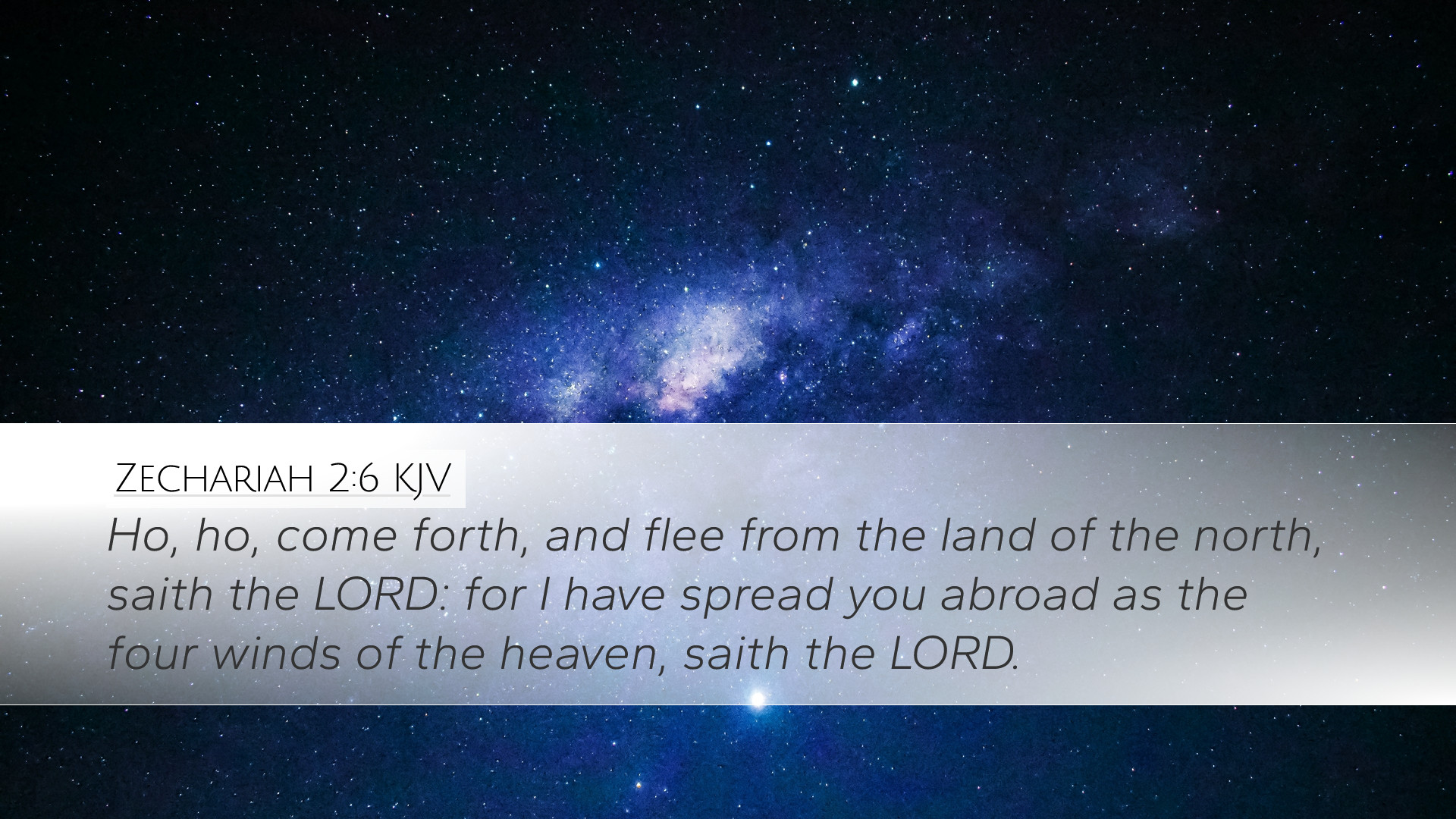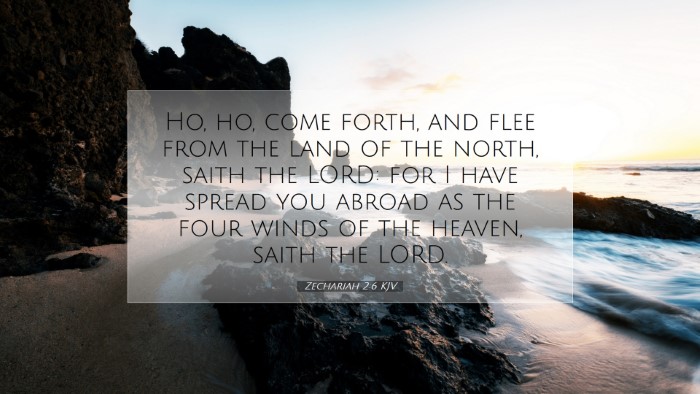Old Testament
Genesis Exodus Leviticus Numbers Deuteronomy Joshua Judges Ruth 1 Samuel 2 Samuel 1 Kings 2 Kings 1 Chronicles 2 Chronicles Ezra Nehemiah Esther Job Psalms Proverbs Ecclesiastes Song of Solomon Isaiah Jeremiah Lamentations Ezekiel Daniel Hosea Joel Amos Obadiah Jonah Micah Nahum Habakkuk Zephaniah Haggai Zechariah MalachiZechariah 2:6
Zechariah 2:6 KJV
Ho, ho, come forth, and flee from the land of the north, saith the LORD: for I have spread you abroad as the four winds of the heaven, saith the LORD.
Zechariah 2:6 Bible Commentary
Commentary on Zechariah 2:6
"Ho, ho, come forth, and flee from the land of the north, saith the Lord: for I have spread you abroad as the four winds of the heaven, saith the Lord."
Introduction
The verse Zechariah 2:6 holds a significant place in the prophetic literature, addressing both the immediate context of the Jewish exiles and the larger narrative of God's salvific plan for His people. This commentary synthesizes insights from notable public domain commentators, including Matthew Henry, Albert Barnes, and Adam Clarke, to bring forth a rich exploration of this text.
Verse Breakdown
Zechariah's directive, "Ho, ho," serves as an urgent call, emphasizing the seriousness of the message. The "land of the north" typically symbolizes Babylon, from which the exiles are summoned to return. The phrase "spread you abroad as the four winds" signifies God's action in dispersing His people, yet it hints at His overarching sovereignty and purpose in gathering them back.
Divine Urgency
Henry describes the Lord's call as a summons of mercy and hope, illustrating God's desire for His people to heed His voice and embrace the freedom offered through return. This call is an invitation—a beckoning to recognize that although they have been scattered, they are not abandoned. Similarly, Barnes emphasizes the necessity for the exiles to act promptly and decisively, as God's divine intention is to restore and revitalize His people.
The Land of the North
In scriptural interpretation, the "land of the north" denotes Babylon, where the Jewish captives resided. Clarke elaborates on the symbolism of this locale by indicating it not only represents geographical distance but also spiritual estrangement. The north is often an image of danger, and the call to "flee" serves as a reminder of the potential perils of remaining in a foreign land that lacks the presence and promises of God.
God's Sovereignty in Dispersion and Gathering
Each commentator emphasizes God's active role in both the scattering and the gathering of His people. Barnes notes that the four winds signify the totality of God's reach and might, while Henry emphasizes that the Lord's ability to spread His people abroad serves a dual purpose—it is both a judgment and a means of preservation. This duality demonstrates a profound truth about divine providence: even in exile, God is at work.
Implications for the People of God
The implications of this verse extend beyond historical context and echo into contemporary faith communities. Clarke draws attention to the notion of spiritual exile and encourages believers to reflect on their own "lands of the north"—those places or situations that draw them away from God’s intended purpose. The call to flee highlights the necessity of personal and corporate repentance.
Encouragement to Return
The promise embedded within Zechariah 2:6 is an encouragement to return. As God's people heed this call, they are assured of His protection and provision. Henry conveys the weight of expectation from God as He yearns for His people to come back to a place of safety. This motif of return is central not only in the Old Testament but resonates throughout scripture, depicting God’s constant pursuit of His people.
Application for Theological Reflection
Theological reflection on this verse invites pastors and scholars to explore the themes of exile and restoration within their communities. It encourages engagement with narratives that highlight God's unending desire to gather His people. Barnes suggests applying this concerning the modern believer's life, urging them to recognize ways in which they might be 'scattered' and needing re-alignment with God's purposes.
Conclusion
Ultimately, Zechariah 2:6 is a striking reminder of God's sovereignty, an exhortation to return, and an invitation to embrace the fullness of life available through Him. The interplay of divine call, human response, and the motif of restoration captures the essence of the relationship between God and His people—a dynamic that remains ever relevant today.


